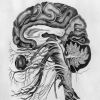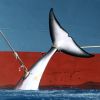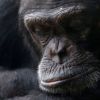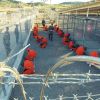-
 +19 +1
+19 +1Animal minds
The inner lives of animals are hard to study. But there is evidence that they may be a lot richer than science once thought.
-
 +41 +1
+41 +1How to spot a psychopath (according to a psychopath)
One self-proclaiming psychopath has described how he presents himself in society and given a breakdown on his behaviour in different situations in what may provide an answer to that question.
-
 +25 +1
+25 +1Violence, victors and victims: how to look at the art of the British empire
There can be few more contentious subjects than the empire, and few artistic legacies more explosive. Now, Tate Britain is to hold the first major British exhibition of masterworks from the colonial period – and the results are revealing. By William Dalrymple.
-
 +20 +1
+20 +1Why Auden Left
To make sense of the intellectual climate of Britain on the eve of the Second World War, one could do worse than to turn to the case of W.H. Auden. By Spencer Lenfield.
-
 +22 +1
+22 +1One Year After the Senate Torture Report, No One’s Read It and It Might Be Destroyed
The 6,700-word study still has not been made publicly available, and in fact, appears to be prohibited among officials in the executive branch. By Murtaza Hussain.
-
 +12 +1
+12 +1In danger
The strange life and tragic death of Julia the gorilla. By Anna Krien.
-
 +25 +1
+25 +1The Man on the Operating Table
Baynazar Mohammad Nazar was a husband and a father of four — and a patient killed during the attack on the MSF hospital in Kunduz. This is his story. By Andrew Quilty.
-
 +19 +1
+19 +1What Happens If Someone Uses This DIY Gene Hacking Kit to Make Mutant Bacteria?
As the DIY bio movement grows, questions have been raised about the consequences of bringing the technology to all. By Kari Paul.
-
 +15 +1
+15 +1U.S. First Shields Its Torturers and War Criminals From Prosecution, Now Officially Honors Them
With Joe Biden’s praise for Dick Cheney at the unveiling of his Capitol “bust,” the U.S. government signals to the world that it regards itself as exempt from the laws of wars, the Nuremberg prohibition against aggressive invasions, and global prohibitions on torture. By Glenn Greenwald.
-
 +23 +1
+23 +1The Japanese Barely Eat Whale. So Why Do They Keep Whaling?
Japan announced this week that it would resume hunting minke whales in defiance of an international moratorium. Why? By Sarah Zhang.
-
 +22 +1
+22 +1Grace Notes
Rowan Williams reviews “Strangers Drowning: Voyages to the Brink of Moral Extremity,” by Larissa MacFarquhar.
-
 +20 +1
+20 +1When a kid kills his longtime abuser, who's the victim?
The perplexing double standards of death penalty politics. By Marc Bookman.
-
 +18 +1
+18 +1They Shoot Kangaroos, Don’t They?
Australia is home to 24 million people and roughly 60 million kangaroos. The cuddly looking creatures are still a beloved national icon, but they're also the scourge of ranchers, frequent roadkill, a favorite on restaurant menus, and now the target of government-sponsored sharpshooters. Our writer hops Down Under for a rugged tour of one of the world's most surprising human-animal conflicts. By Paul Kvinta.
-
 +23 +1
+23 +1“Why Him? Why Me?”
Two tragic collisions on the football field, separated by 26 years, have brought together a high school linebacker and a former college running back in search of the answer to a life-altering question. By Eli Saslow.
-
 +36 +1
+36 +1Is evil a disease? ISIS and the neuroscience of brutality
It's hard to understand how the Nazis, ISIS and other radical groups can turn ordinary people into brutal killers. But perhaps evil is a disease – one we can treat. (Nov. 11)
-
 +18 +1
+18 +15 Yemeni Guantánamo Inmates Are Sent to United Arab Emirates
The lower-level detainees had been held for nearly 14 years but never charged with a crime, and their transfers reduce the population at the prison in Cuba to 107. By Charlie Savage.
-
 +8 +1
+8 +1Plan to Export Chimps Tests Law to Protect Species
A plan to export eight chimps from a research center in Atlanta to a zoo in England is a first test of an endangered species listing that says that only actions that benefit chimpanzees as a species should be allowed. By James Gorman.
-
 +29 +1
+29 +1Organ waiting list policy benefits the wealthy, study charges
Wealthier patients can afford to get on more organ transplant lists, giving them an advantage, a new study says. By Laura Beil.
-
 +25 +1
+25 +1Neuroscience: Tortured reasoning
Lasana T. Harris commends a book exposing the lack of scientific basis to ‘enhanced interrogation techniques’.
-
 +28 +1
+28 +1Look who’s back
Anna Katharina Schaffner reviews Gavriel D. Rosenfeld’s “Hi Hitler! How the Nazi past is being normalized in contemporary culture.”
Submit a link
Start a discussion




















